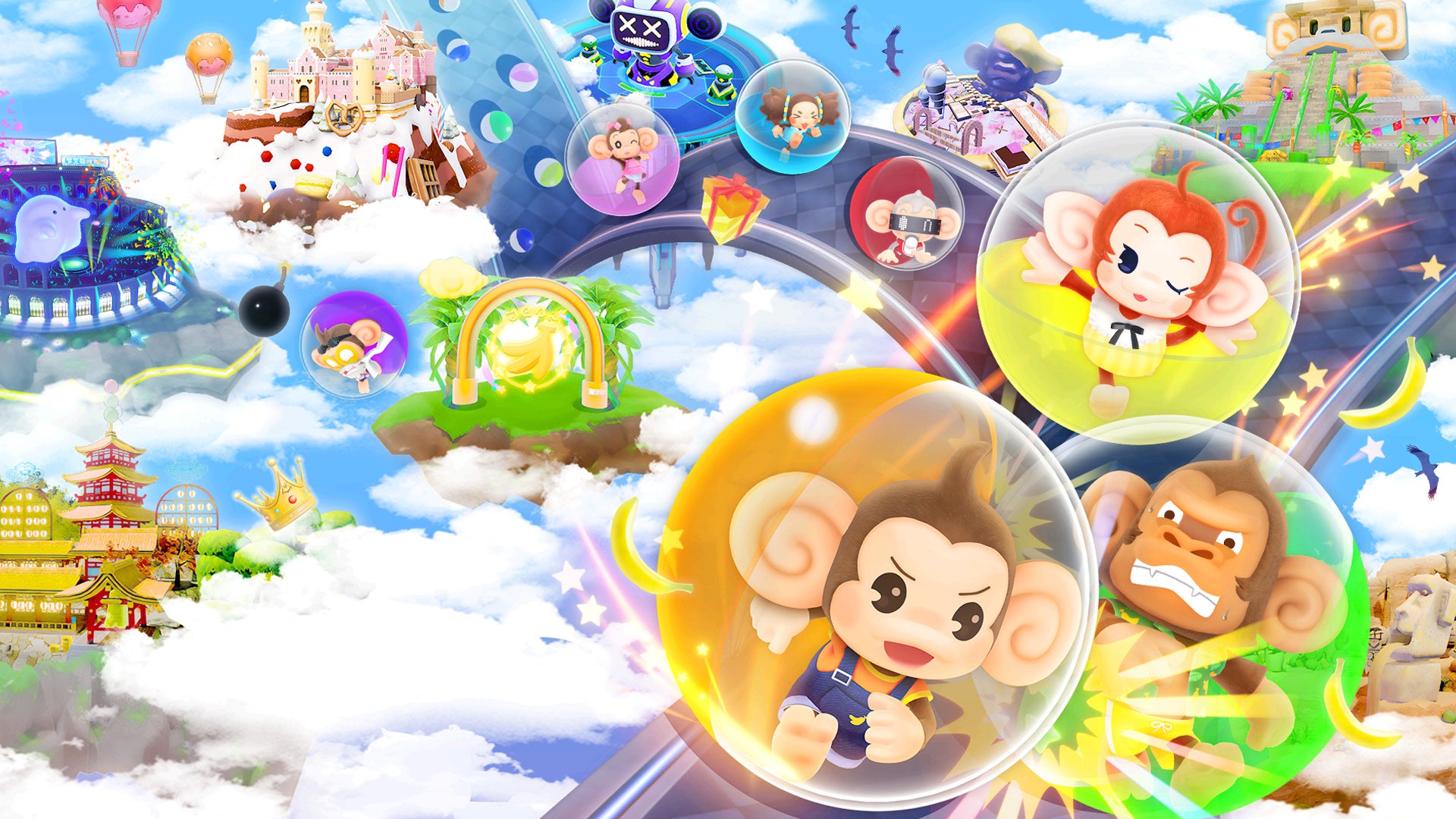I’ve spent every evening the past week reuniting with a dear old friend. Super Monkey Ball and I were inseparable back in the GameCube days, but we grew apart when the series traded in its perfect blend of devilish challenges and finely-tuned physics for bland level design and imprecise motion controls aimed at a more casual audience – so you can imagine my apathy when Super Monkey Ball Banana Rumble’s initial announcement focused so heavily on the uncontrolled chaos of its 16-player online battles. But I’ve never been happier to be wrong, as tucked away inside Banana Rumble is the greatest set of traditional Super Monkey Ball levels the series has seen since the GameCube originals, backed up by tight mechanics that give me the complete control I needed to overcome its demanding late-game obstacles. Monkey Ball is finally back, and now all I want to do is roll.
Banana Rumble’s impressive set of 200 courses is divided into 20 cartoony worlds containing 10 stages apiece. In classic Monkey Ball fashion, the setup is delightfully simple: You have 60 seconds to roll your monkey from the start to the goal, but the hurdles between those points change radically across the adventure. The opening stages aren’t too challenging, smartly acquainting you with Banana Rumble’s mechanics so you’re ready to go when it does turn up the heat.
As a certified Super Monkey Ball 2 master, I had no trouble with the first 80 levels or so. But they’re still a joy to roll through, as I had to deal with curves, ramps, rails, switches, and bumps reminiscent of the level design seen in the excellent Super Monkey Ball 1 and 2. Plus, speedrunning is a classic element of the originals, and it was a ton of fun to see how rapidly I could blast through levels that don’t demand too much precision, like stages where you can slam dunk into the goal with a perfect launch right from the start if you know what you’re doing. I realized pretty quickly that Banana Rumble was a return to form for the series, and I had the best time rolling through the early levels while bopping to the wonderful GameCube-inspired soundtrack.
That breezy feeling didn’t last long, though, as Banana Rumble does not hold back in its second half. The 10 EX worlds unlocked after completing the main story delivered on all the Monkey Ball challenge I’ve been begging for the series to bring back. Suddenly, I was dealing with grueling stages that truly tested my monkey mettle, from crazy rotating contraptions to invisible tilting seesaws to the narrowest of walkways you have to carefully tiptoe across, Banana Rumble is constantly introducing new challenges and smart twists on old ones. Some of the final levels took me dozens of attempts, and there’s nothing quite like the feeling when my main monkey AiAi finally breaks through that one elusive goal. In fact, I’ve been so engrossed in completing every stage Banana Rumble has to offer that one night I couldn’t even be bothered to get up to turn the lights on after it got dark outside, so I was sitting in complete darkness rolling my monkey around until well past midnight. Totally worth it.
Chaos, Controlled
That fantastic stage design and variety means nothing unless it feels right, and Super Monkey Ball nails it for the first time in decades. While it may look like you are directly moving your orb through each course, Super Monkey Ball is actually about controlling the stage, not the monkey. At its best, the control stick is aligned 1:1 with the angle of the stage, giving you pinpoint-precise command over how the terrain tilts – and in turn, how your monkey rolls through it.
2021’s Banana Mania (which remade all the levels found in Super Monkey Ball 1, 2, and Deluxe) should have been a home run as it returned to the best stages in series history, but the controls were so sluggish and imprecise that it made them overly frustrating at best and borderline unplayable at worst. Exact controls are a necessity for the toughest levels, and Banana Rumble handles so well that whenever I fell off the stage it almost always felt like my fault, which inspired me to improve on the next run. Banana Rumble even offers extensive control options for both the stage and the camera, so I cranked every possible setting to the max and found that gave me the expert level of control I was seeking. The physics aren’t entirely perfect – sometimes I didn’t get the level of bounce I expected when dropping from a high ledge – but this is still easily the best-feeling Super Monkey Ball since the first two.
Banana Rumble has also finally ditched the series poorly-implemented jumping mechanic (if I’m tilting the stage and my monkey is trapped in a ball, why would they be able to jump?) in favor of an exciting new spin dash, which takes a page from Sonic the Hedgehog and lets you charge up and release a quick burst of speed. Whereas the jump never amounted to more than a gimmick in past games, the spin dash is a genius evolution of Monkey Ball’s core mechanics. It’s only mandatory in a handful of levels, but almost every single stage has some sort of shortcut or exploit that’s only possible to pull off thanks to this new ability.
A properly-aimed spin dash can catapult your poor monkey across the map in the blink of an eye, and it’s a speedrunner’s dream to uncover all the ways to take advantage of this smart addition. Banana Rumble rewards players who understand the mechanics and level design with optional routes hiding in plain sight that require expert skill to reach, and it adds a lot of replay value to an already packed adventure.
Banana Split-Screen
Multiplayer has been welcomed back to the main game, which was shockingly missing from the last two entries. You can tackle all 200 stages with up to three other players in split-screen local multiplayer or online co-op. Playing with others online is pretty seamless – I played through the entire campaign online with a friend and we never had a disconnect. Banana Rumble also runs at a very smooth 60 FPS when playing alone on Nintendo Switch, and it maintains that level of performance when you add online play into the mix. The frame rate takes a slight hit in split-screen, but not to the point where it feels unplayable.
Playing with others turns Banana Rumble into a surprisingly strategic cooperative experience. Everyone begins the stage at the same time, and only one player has to complete it in order for the group to move on. This also makes each level’s optional missions easier to complete: Every stage tasks you with collecting a certain number of bananas, completing it in under a certain number of seconds, and finding the hidden golden banana which often requires a high-level technique to snag. Assigning one person to get to the goal as fast as possible while the rest seek out bananas adds a fun layer of planning to the whole experience. I even had fun tackling levels online with random players, as I helped some Monkey Ball rookies clear some easier worlds and worked with others to grab some tricky golden bananas in later stages, using encouraging emotes and phrases to cheer my teammates on. I only wish Banana Rumble also included a more traditional Challenge Mode where you take turns and work through all of the levels individually at your own pace.
One issue with online multiplayer is that it kicks all of you out of a party after you complete a world, so I would have to share a new lobby code with my friend every single time we wanted to keep playing. Additionally, when working through the adventure mode online, Banana Rumble doesn’t show you the story cutscenes, meaning if you want to know what’s going on with AiAi, MeeMee, Baby, GonGon, and their new friend Palette, you’ll have to either play locally or catch up on all the cutscenes in the gallery after the fact. I don’t play Monkey Ball for the story – and the story here is extremely basic and barebones anyways – so I actually preferred not seeing the cutscenes so we could get straight to the stages, but it does feel like a strange omission.
Banana Rumble’s biggest monkey’s paw wish is its aforementioned battle mode. Longtime Super Monkey Ball fans know how iconic legacy party games like Monkey Target and Monkey Bowling are, but there’s nothing here that held my attention for more than a couple minutes. The five modes all feel extremely shallow and uninspired, with so few maps in rotation that I felt like I’d seen everything they had to offer after less than an hour. There’s generic racing, banana gathering, and bomb passing that feel like cheap knockoffs of Mario Kart 8 Deluxe’s battle mode. I’m guessing others feel the same way, as it took me several minutes to find a match with a full 16 players just a few days after launch. The performance also takes a serious hit in battle mode, reducing the smooth 60 FPS of the adventure mode to a choppy slideshow at times. Local multiplayer comes with its own set of limitations, as you can’t play battle mode online with two people on the same system, and three-to-four player battles aren’t even an option locally.
But even if you completely ignore Banana Rumble’s undercooked battle mode, there’s still so much to do here. I’ve already completed all 200 stages, but I’m nowhere close to finishing all of the stage missions – some of which I’m still scratching my head at as I try to figure out how I’m supposed to grab dozens of bananas and make it to the goal in time. There are hundreds of cosmetic items to buy with in-game points to style your monkey, too. I’m a simple man, so I bought AiAi’s classic orange T-shirt from the original games and called it good, but it’s cool how many outfits and accessories are available for Banana Rumble’s 12 playable characters (or more, if you get the optional SEGA Pass that adds Sonic the Hedgehog and friends to the mix).







